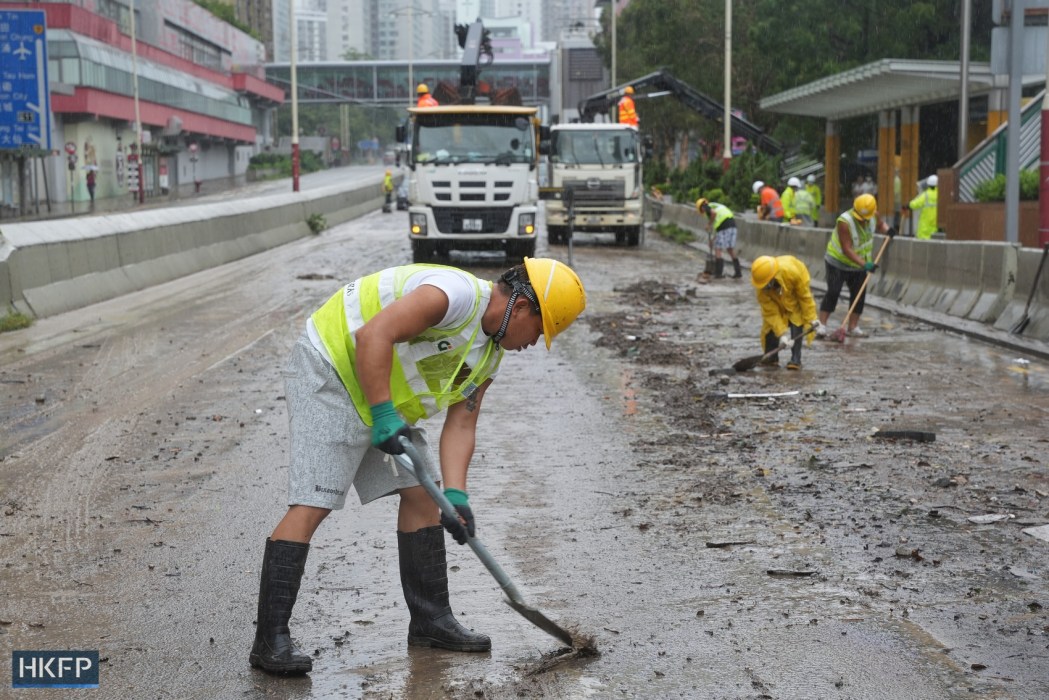Hong Kong will step up disaster preparedness in response to recent extreme weather events, including by reviewing transport arrangements and improving drainage works.

Delivering his second Policy Address on Wednesday since running unopposed to become chief executive, John Lee said the government had already strengthened “co-ordination and teamwork” in response to recent typhoons and torrential rainstorms – but that more could be done.
“With global climate change intensifying, it is likely that we will experience extreme weather more often,” Lee said. “We will enhance our handling capabilities in respect of early warning, emergency preparedness, response and recovery to minimise the impact on society, with protecting people’s safety as our priority.”
Lee said the government would request bodies such as the Airport Authority and the MTR Corporation to “conduct a comprehensive review of their contingency plan,” after Typhoon Koinu earlier this month left travellers and commuters stranded due to train suspensions.
🛬🇭🇰
— Aaron Busch (@tripperhead) October 8, 2023
Utter chaos at Hong Kong International Airport tonight, with planes continuing to land, but no buses or Airport Express to get arriving passengers out of the airport.
Taxi queue rank wait: 3+ hours.
(📸: @denvy) pic.twitter.com/1Eljlhbwmv
The authorities would also look into “exploring ways to use big data, AI and other technology” to improve risk assessment capabilities when it comes to disasters such as flooding and landslide hazards.
An HK$8 billion drainage improvement works project would cover areas hit hard by floods, including Wong Tai Sin and eastern Hong Kong island, Lee said.
Separately, Lee added that Hong Kong would enhance coordination of emergency management across the Greater Bay Area (GBA).
“The Mainland has strong emergency-response capability, especially in terms of installation of heavy-duty equipment,” he said. “A collaborative and complementary emergency-response mechanism will create synergy and benefit us all in the GBA.”

Hong Kong was hit by a series of extreme weather events in recent weeks. Super Typhoon Saola in early September triggered the highest typhoon warning signal for the first time since 2018, with hundreds of flights cancelled amid strong winds. Less than a week later, a torrential downpour that authorities referred to as “once in a century” saw roads flooded and an entire MTR exit submerged, as the Black rainstorm warning remained in place for a record-breaking 16 hours.
Environmental experts have attributed the incidents to climate change and called on the government to enhance the city’s resilience in the face of natural disasters.
HK$50 million for wheelchair friendly e-taxis
Lee also announced a number of environmental policies in his second Policy Address. The city has promoted the use of electric vehicles for several years, introducing a waiver of new car registration fees for private electric cars in 2018.

Lee said on Wednesday that “between the end of this year and next year, we will continue to test out more new energy vehicles, including electric public light buses, electric heavy goods vehicles, electric coaches, hydrogen double-deck buses and hydrogen street washing vehicles.”
Additionally, Lee announced that HK$50 million would be earmarked to subsidise the taxi trade to acquire wheelchair accessible electric taxis, and a “citywide green transformation roadmap and timetable for public buses and taxis” would be formulated in the first half of 2024.
Exploring hydrogen fuel possibilities
Hydrogen has increasingly been identified as a clean fuel alternative. Lee on Wednesday noted that hydrogen fuel could be used for transport, power generation and energy storage, and was “particularly relevant to the green transformation of commercial and heavy goods vehicles.”
“We will formulate the Strategy of Hydrogen Development in Hong Kong in the first half of next year, and commence the preparatory work for the necessary legislative amendments pertaining to the production, storage, transportation and application of hydrogen fuel with a view to introducing a bill into the LegCo in 2025,” Lee said.
Carbon neutrality
Regarding the city’s goal to reach carbon neutrality by 2050, Lee said the government would “consult the trade” this year on the proposal to amend the Buildings Energy Efficiency Ordinance, which regulates buildings’ minimum energy efficiency standards.
The potential amendments aim to expand the regulation to cover more types of buildings and requiring the disclosure of information in energy audit reports.

The government also aims to extend the producer responsibility schemes to more types of products, including plastic beverage containers, beverage cartons, electric vehicle batteries, vehicle tyres and lead-acid batteries, Lee said.
Hong Kong has pledged to cut emissions by half from 2005 levels by 2035 and achieve carbon neutrality by 2050. However, environmental organisations have said the government must do more to meet its carbon goals.
Additional reporting: Mercedes Hutton
Support HKFP | Policies & Ethics | Error/typo? | Contact Us | Newsletter | Transparency & Annual Report | Apps
Help safeguard press freedom & keep HKFP free for all readers by supporting our team

LATEST FROM HKFP
HKFP has an impartial stance, transparent funding, and balanced coverage guided by an Ethics Code and Corrections Policy.
Support press freedom & help us surpass 1,000 monthly Patrons: 100% independent, governed by an ethics code & not-for-profit.











